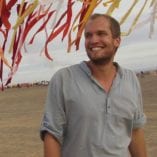My experience at the Arava Institute helped me tremendously to obtain the Fulbright Scholarship and do my graduate studies in the USA.
MUHANAD ALKHARAZ, ALUMNUS SPRING ’12 & FALL ’12, INTERN SPRING ‘13
Arava Institute interns are an integral part of the multi-cultural campus community. Interns join students in peace-building and environmental leadership dialogue, educational field trips, and cultural and community activities.
The Arava Institute is home to transboundary research and development centers focusing on the areas of key environmental concern — water management, renewable energy and energy conservation, sustainable agriculture, ecology, political ecology and environmental diplomacy. Our research enables critical cross-border exchanges of knowledge and technology by providing young Israeli, Palestinian, Jordanian, and international researchers the opportunity to work together and advance solutions to the region’s pressing environmental issues.
INTERNSHIP PROGRAM
Each year, the Arava Institute accepts interns for one to two semesters. Interns contribute substantively to transboundary research through a defined project under the direction of an Arava Institute researcher, while gaining valuable professional, academic, and personal experience.
Interns develop skills in environmental research and development, environmental policy, and project management while gaining important professional contacts. In addition to building effective community-based and professional partnerships; interns become a vital part of the global network of accomplished Arava Institute alumni.
The Arava Institute welcomes interns from varied backgrounds, including the social and the natural sciences.
APPLY
To apply, please fill in the online form, and contact admissions@arava.org for more details.
Sampling of Research
CENTER FOR RENEWABLE ENERGY & ENERGY CONSERVATION
- design & thermal performance investigation of a solar air collector
- energy poverty in Israel, Jordan and the PA
- decentralized energy production
- environmental, social and economic aspects of energy storage
- water – energy – food nexus
- energy transition and society
- social innovation and energy transition (prosumerism, community energy, energy citizenship, P2P, democratizing the energy system etc.)
- climate diplomacy / geopolitics of the energy transition
- hydrogen production by metal hydrolysis
- energy transition and society
- agrophotovoltaics
- green hydrogen
- digitalization and energy transition
CENTER FOR TRANSBOUNDARY WATER MANAGEMENT
- water & energy capacity for Palestinian date farmers in the Jordan valley
- decentralized onsite greywater treatment & reuse for rural communities
CENTER FOR SUSTAINABLE AGRICULTURE
- Professional development in orchard management and long-term research of domestication of a commercial crop (Argania spinosa)
- Desert plant horticulture: botanical surveying, propagation, and maintenance of desert garden for rare and medicinal plants
- using treating waste water as irrigation source for field crops in hyper arid regions (pilot project in cooperation with the Center for Transboundary Water Management)
- Aquaculture research
CENTER FOR ARID SOCIO-ECOLOGY
- Ecosystem Services
- biodiversity and food webs
- Acacia research
- geo-ecology of Wadi Shita
- eco-hydrology
- soil quality
- oil spill reclamation
- plant biodiversity
- Flowering strips to support desert agriculture and biodiversity conservation
- Working with farmers – an applied environmental leadership internship
CENTER FOR APPLIED ENVIRONMENTAL DIPLOMACY
- EcoFutures – Cross-border cooperation and sustainable development in the Jordan Valley
- Harvesting Cooperation – Water, Energy, Food Security, and the Environment – capacity building and cross-border policy
- Multi-year Water Allocation Systems – Israel, Palestine, and Jordan
- Jumpstarting Hope in Gaza – Introducing decentralized technologies in Gaza as interim WASH and energy service solutions.
COMMUNICATIONS AND MEDIA
Communications and Media Intern
CENTER FOR CLIMATE CHANGE POLICY AND RESEARCH
- Eco-district model for Palestine
- Impacts of Climate change on Energy Poverty
- Climate Change Center conference assistance: “Climate Change and sustainable planning of resources”
ADMINISTRATIVE INTERNSHIPS AVAILABLE – please contact admissions@arava.org for more details.
For further details about research projects, please visit the Arava Institute Research Center pages.
COST
Participation in an internship includes room, board (a full meal plan in the kibbutz dining room), office space, supervisory and administrative expenses, health insurance, and academic activities and field trips. There is a cost to cover these expenses and many participants utilize scholarships to pay for their program. If you have questions about funding your experience, reach out to us at admissions@arava.org.
I have a Bachelor’s degree of Chemical Engineering from the Technical University of Munich, and am currently studying Energy and Process Engineering. My main academic interest is water management and desalination, but I have also worked in projects about renewable energy sources and microalgae as biofuel. As I believe that access to clean water should be considered a basic human right, I volunteer at an NGO that funds drinking water projects in Third World countries and raises awareness about the issue.
I came to Ketura to write my Master thesis about a solar desalination project of my university in cooperation with the Arava Institute. This topic has attracted attention in recent years due to an increased global demand for drinking water, and the ongoing pollution of existing fresh water sources. The experimental setup at the Institute consists of a photovoltaic thermal hybrid solar collector and a reverse osmosis unit. The energy used to desalinate brackish or seawater is stored in a battery that is supplied by the photovoltaic cells. The idea behind the project is to simultaneously preheat the feed water and cool the solar panels, as photovoltaic cells show a higher efficiency at lower temperature. The water used to cool the solar panels is then used as feed water. Increased input temperatures enhance migration processes and therefore guarantee a higher fresh water output.

